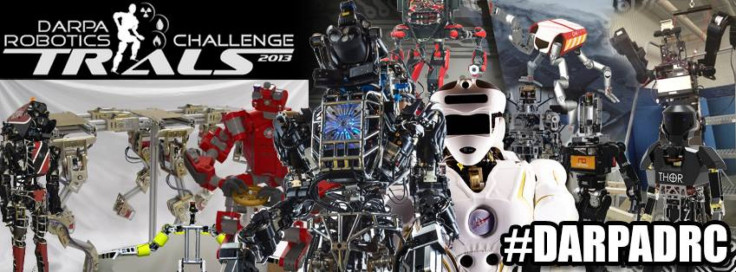DARPA Robotics Challenge 2013: Meet The Teams Hoping To Advance To The 2014 Finals And $2M Prize [VIDEOS]

The DARPA Robotics Challenge Trials 2013 behin Friday at the Homestead Miami Speedway. Seventeen teams are competing to reach the 2014 Finals, and one team will take home the grand prize of $2 million.
The 17 teams were chosen as part of four different tracks. Six "Track A" teams were chosen and founded in June 2013, notes DARPA. Track B and Track C teams battled it out for future funding, developing software, and control of an ATLAS robot, developed by Boston Dynamics, during the DARPA Robotics Challenge Trials and seven teams were chosen as part of this track. Track D featured experienced teams that developed their own software and hardware. The teams will compete in eight tasks over the course of two days.
Task 1 will feature a robot driving a vehicle through a course, getting out of the vehicle and exit the course, for a total of two points. Task 2 has the robots traversing three different types of terrain, for a total of three points. Task 3 has the robot getting on to a ladder, all contact points on or above the first step, climbing to the fourth step and reaching the landing zone, for a total of three points.
Task 4 sees the robots clearing five pieces of debris, a second round of clearing five pieces of debris and exiting a doorway for three points. Task 5 challenges the robot's ability to push open a door, pull open a door and entering a door for three points. Task 6 will give the robots a cordless drill to cut an edge in a selected area, followed by a second and third edge to form a triangle, and the task is complete when the robot removes the triangular piece from the wall for a total of three points. Task 7 has the robots closing three different valves, successful completion is determined by the complete stoppage of air flow, for three points. The final task has the robot moving a hose nozzle to a designated point, touching the wye, or connector, and attaching the nozzle to the wye, for three points.
The Track A Teams include:
Drexel University's DRC-Hubo, a bi-pedal humanoid robot.
NASA's Johnson space Center Team Valkyrie humanoid robot.
NASA's Jet Propulsion Labs' RoboSimian, a robot that can use all four of its limbs for various tasks.
Japan's SCHAFT Inc. a HRP-2 based robot, developing the hardware and software that is focused on a "robust "walking/stabilization system."
Carnegie Mellon University-NREC has developed CMU Highly Intelligent Mobile Platform, CHIMP, robot suited for work in dangerous environments.
Virginia Tech' and the University of Pittsburgh have Tactical Hazardous Operations Robot, THOR, a light but resilient robot.
The seven Track B and C teams developing software for the ATLAS robot will include IHMC Robotics, the Massachusetts Institute of Technology, Team HJU, Team TRACLabs, Team Trooper, Team ViGIR and the WPI Robotics Engineering C Squad, WRECS.
The Track D teams include:
Team Mojavation, a quadruped robot, named Buddy, developed for better stability.
Kairos Autonomi has developed the Chiron robot, a hexapod design to handle uneven terrain. The Intelligent Pioneer Robot and Team KAIST, from South Korea, round out the 17 challengers. The top teams will compete at the DRC Finals in 2014, receiving additional funding from DARPA, and one team will win a $2 million prize.
© Copyright IBTimes 2024. All rights reserved.












